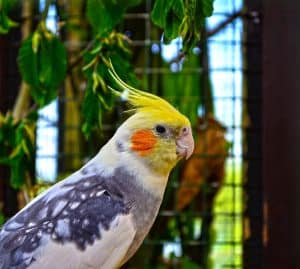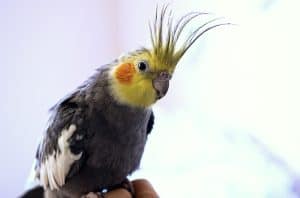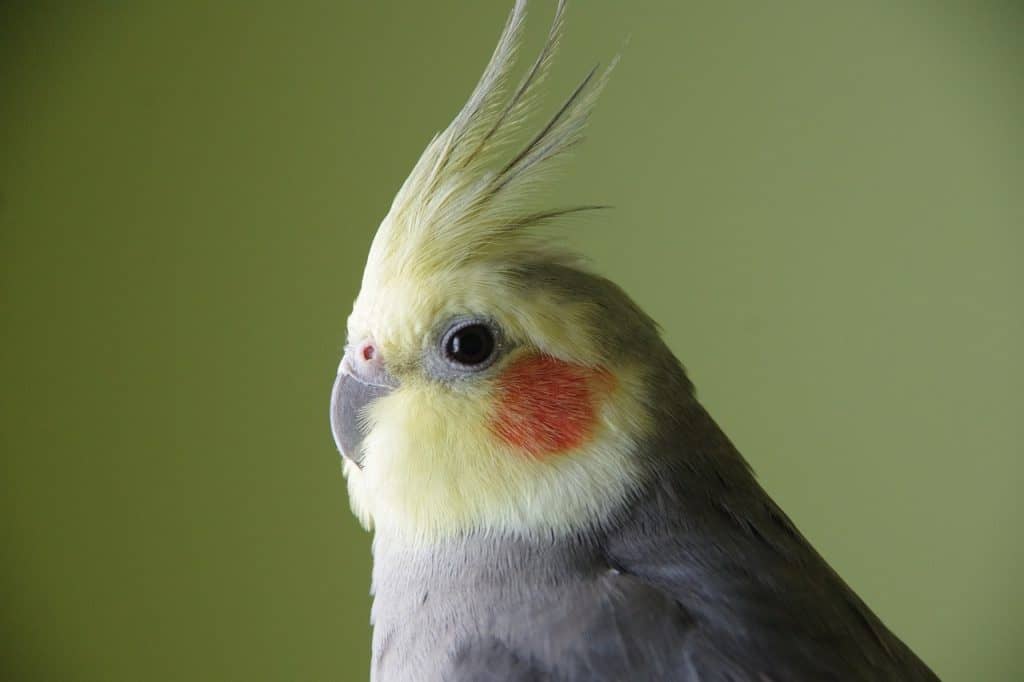How to tame a cockatiel that bites is a common question among pet bird owners. Cockatiels are often chosen as pets because of their friendly and social nature, but sometimes these birds may develop a habit of biting.
A biting cockatiel can be frustrating and even make a loving owner reluctant to interact with their bird. If you are facing this issue, don’t worry! This guide will provide you with a deeper understanding of why your cockatiel bites and offer effective solutions to help you tame your feathery friend.
Cockatiel bites caused by fear
One of the primary reasons a cockatiel bite is fear. These birds, especially young birds, may feel threatened or unsure of their surroundings. In the wild, bird bites would be a natural defense mechanism against potential predators. As a pet bird owner, you must first assess your cockatiel’s environment and behavior to determine if fear is the issue.
Identify perceived danger
Take note of the objects or noises that may be scaring your cockatiel. Removing the perceived danger or gradually introducing your bird to the frightening object will help alleviate its fear.
Safe spaces and bird toys
A scared cockatiel may also feel more secure if they have a designated “safe space” in their environment. Providing this area with their favorite bird toys can help them feel more at ease.
Cockatiel bites due to lack of socialization

Another reason your cockatiel might be biting is a lack of socialization. Young cockatiels need to be gently introduced to their environment and your presence. This process typically involves the bird’s wing feathers being clipped, so the bird loses its ability to fly. Then, the bird is held close to a person’s chest and given lots of love and attention.
If your cockatiel is biting because they are not used to being handled, try spending more time with them outside the cage. Hold them gently through the cage bars and speak in a soothing tone. Then gradually increase the time you spend together, always handling your bird with care and patience.
Cockatiel bites due to territorial or hormonal behavior
Sometimes, cockatiel bites may be the result of territorial or hormonal aggressive behavior. Aggressive cockatiels, particularly males, may bite to establish dominance or protect their territory. In these cases, it’s essential to address these aggressive behaviors and establish a healthy relationship with your bird.
- Challenges Your Parrot Mentally & Physically --- Toys are a necessity for parrots. They provide essential physical activity so that our intelligent feathered pets stay healthy. Bird Chewing Toy by SunGrow provides opportunities for parrots in the cage which they undertake when living in their native habitat. There are several multi-colored blocks in this single toy to make your bird active. These blocks are arranged in multiple layers to climb and explore.
- Entertaining Toy For Your Birds --- A parrot with nothing to do is a prime candidate for behavioral problems. Some parrots tend to be more disruptive during certain times of the year, usually during their breeding period. SunGrows bird chewing and preening toy is a perfect companion to keep your parrots busy, less disruptive and have more fun hours which keep them active mentally.
- Edible Chew Toy --- It is important for the avian species that we keep something for them to chew on. In their native habitat, they engage in chiseling holes and tearing up branches. This is something innate to them. The wooden blocks chew toy by SunGrow is made from wood and cotton rope. So when they nudge on to their toy, it would keep them content. So if you dont spot your green cheek outside playing, just hover a little inside. They might be hiding amongst the blocks and savoring them.
- Right Size For Your Bird --- The Bird Chewing Toy by SunGrow comes with a standard size of 40cm (15.7) x 10cm (3.9) and fits well in your beloved feathered pets cage. The included metal buckle holds this toy in place. Its crunch potential is ideal for small parrots and medium-sized, conure-sized birds. It is suggested for macaws, African greys, Cockatiels, Cockatoos, Budgies, Lovebirds, pigeons, and a variety of Amazon parrots as well.
How to stop biting: Techniques for taming a biting cockatiel
Taming a cockatiel that bites requires patience and understanding. Training is key in overcoming biting behavior and creating trust with your feathered companion.
Taming sessions at the same time daily
Schedule regular taming sessions with your cockatiel, preferably at roughly the same time each day. This routine will help your bird feel more secure and provide them with something to look forward to.
Positive reinforcement
Utilize positive reinforcement during your training sessions. Instead of punishing your bird for bad behavior, reward them with a treat or praise when they behave well. If your cockatiel bites during a session, say “no” in a stern voice, and pull away briefly. Then continue with the session, rewarding any good behavior that follows.
Be mindful of body language
Reading your cockatiel’s body language is essential for building trust and avoiding bites. Observe your bird and learn to recognize when they are uncomfortable or scared. Pay attention to the way your bird fluffs its feathers or the position of its crest. By understanding your bird’s body language, you can anticipate and prevent biting incidents.
Building trust through bonding so your cockatiel loses interest in biting
The key to taming an aggressive cockatiel is to build a relationship based on trust. It is essential to interact with your cockatiel daily, holding and petting them while speaking calmly. A good time to do this could be when your bird is relaxed or simply spending time in their cage. Always remember to move slowly and gently to avoid startling your bird.
Gentle handling and head scratches
Slowly start to handle your cockatiel more frequently, taking care not to apply too much pressure or force. Begin by gently scratching your cockatiel’s head and neck, allowing them to get used to your touch. Gradually increase the amount of handling over several sessions, always ensuring your bird feels comfortable and secure.
Be patient and consistent
Taming a cockatiel that bites takes time and consistency. Be prepared for setbacks and resist the urge to give up. With patience, love, and dedication, your bird will eventually trust you and lose interest in biting.
Understanding the reasons behind your cockatiel’s biting behavior is the first step toward taming a cockatiel that bites. By employing a combination of positive reinforcement, trust-building techniques, and regular training sessions, you will eventually have a tame cockatiel free from aggressive behaviors. Remember always to be patient, approach your bird with gentle confidence, and seek advice from a local pet store, veterinarian, or fellow bird owners if you need further guidance.
- How Can Your Other Pets Be Harmful To Your Cockatiel
- How Cockatiels Show Affection
- How Do Children Make Cockatiels As Pets
- How Do Cockatiels See
- How Do Cockatiels Sleep
- How Do Fumes Affect Your Cockatiel
- How Do You Care For Your Cockatiel Everyday
- How Do You Choose A Cage For Your Cockatiel
- How Do You Medicate Cockatiels
- How Do You Provide Your Cockatiel With Water
- How Do You Select Your Cockatiel
- How Do You Tame A Cockatiel
- How Does A Cockatiel Got Her Name
- How Far Can A Cockatiel Fly
- How Far Can A Cockatiel See
- How Fast Can Cockatiels Fly
- How Good Is A Cockatiels Memory
- How Long Can A Cockatiel Go Without Food
- How Long Can Cockatiels Go Without Water
- How Long Do Cockatiels Actually Live For In Captivity
- How Long Do Cockatiels Live In Captivity
- How Long Does It Take For Clipped Wings To Grow Back
- How Long Does It Take For Cockatiel Tail Feathers To Grow Back
- How Long Should A Cockatiel Be Out Of Its Cage
- How Often Do Cockatiels Lay Eggs
- How Often Do Cockatiels Poop
- How Often Should A Cockatiel Go To The Vet
- How Should I Set Up My Cockatiels Cage
- How To Bathe Your Cockatiel
- How To Bird Proof A Room
- How To Bond Two Cockatiels
- How To Bond With A Scared Cockatiel
- How To Build Trust With A New Cockatiel
- How To Calm A Stressed Cockatiel
- How To Care For Your Cockatiels Health
- How To Care For Your Cockatiels Nails
- How To Catch A Cockatiel
- How To Clean Cockatiel Nose
- How To Clip A Cockatiels Nails
- How To Discipline A Cockatiel
- How To Find A Cockatiel That Flew Away
- How To Get A Cockatiel Back Into Its Cage
- How To Get A Cockatiel To Go On Your Hand
- How To Get A Cockatiel To Like You
- How To Get A Cockatiel To Sit On Your Finger
- How To Give Your Cockatiel Exercise
- How To Grow Millet For Cockatiels
- How To Hold A Cockatiel
- How To Introduce A New Cockatiel To Another
- How To Keep A Cockatiel Quiet
- How To Keep A Cockatiel Warm 10 Tips And Tricks
- How To Maintain A Clean Cockatiel Cage
- How To Make Your New Cockatiel Feel At Home
- How To Manage Multiple Cockatiels In One Household
- How To Monitor Your Cockatiels Health
- How To Prepare Your Cockatiel For Travel
- How To Prevent Your Cockatiel From Becoming Stressed
- How To Recognize And Treat Cockatiel Anxiety
- How To Take Care Of An Older Cockatiel
- How To Tame A Cockatiel That Bites
- How To Tame Your Cockatiel
- How To Teach A Cockatiel To Talk
- How To Tell If A Cockatiel Is In Pain
- How To Tell The Age Of A Cockatiel
- How To Toilet Train Your Cockatiel
- How To Train A Cockatiel To Fly To You 8 Steps
- How To Train A Cockatiel To Poop In One Place
- How To Train Naughty Cockatiels
- How To Transition Your Cockatiel To A New Cage
- How To Transport A Cockatiel To The Vet
- How To Trim A Cockatiels Beak
- How To Trim Your Cockatiels Wings




